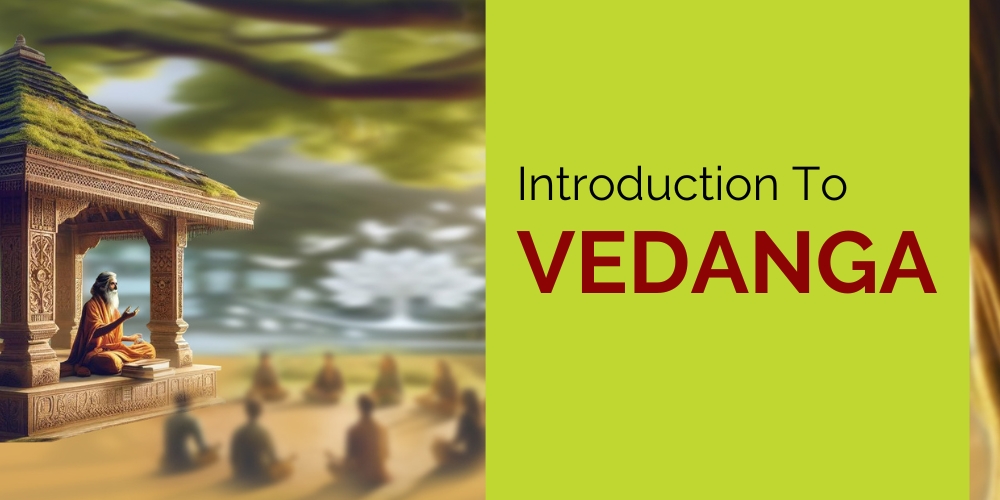
Introduction to Vedanga
Join us as we delve into each discipline, which serves as a crucial component in enhancing our understanding and appreciation of Vedic literature:
- Shiksha (Phonetics): Learn the precise sounds of Sanskrit to ensure correct pronunciation and intonation, essential for Vedic rituals.
- Kalpa (Ritual): Gain insight into the detailed rules for conducting Vedic rituals.
- Vyakarana (Grammar): Achieve mastery over Sanskrit grammar to ensure accurate interpretation of the Vedas.
- Nirukta (Etymology): Analyze Vedic words to uncover their deep meanings.
- Chandas (Meter): Study the poetic structures of Vedic hymns to appreciate their composition.
- Jyotisha (Astronomy): Understand the role of astronomy in determining auspicious timings for rituals and ceremonies.
This course aims not only to educate but also to connect participants with the rich spiritual heritage of ancient India, offering a transformative experience that deepens both knowledge and personal growth.
Faculty
12 July 2024 - 22 November 2024
6:00 PM-7:00 PM IST
Every Friday
Introduction
This course welcomes individuals aged 15 and above who are eager to delve into the profound depths of the Vedangas. It’s designed to provide a deeper understanding of these ancient texts, their relevance today, and practical applications. Each learner will engage in homework assignments aimed at fostering self-reflection and personal study.
Objectives
- Gain a foundational understanding of the Vedangas.
- Explore the primary texts and their structural nuances.
Expected Outcomes
- Acquire comprehensive knowledge of Vedic literature.
- Explore the roles and significance of key Vedic deities.
- Learn about supplementary Vedic texts.
- Learn about the Vedangas, including detailed insights into their structure and practical applications.
- Discover the modern relevance of Vedangas in contemporary practices such as language studies, yoga, and meditation.
Syllabus
- Overview of Vedic Literature:
- Introduction to the Vedas: Rigveda, Yajurveda, Samaveda, Atharvaveda.
- Vedic Deities:
- Exploration of key deities such as Agni, Indra, and Varuna.
- Supplementary Texts:
- Understanding Brahmanas, Aranyakas, and Upanishads.
- Vedangas – An Introduction:
- What are Vedangas? Why are they significant?
- Their modern-day relevance and applications.
- Understand the relevance of Vedangas in modern studies of language, yoga, meditation, and spirituality.
- Discover how the timeless insights from the Vedas can enhance and enrich contemporary lifestyles.
- Detailed Study of Each Vedanga:
- Vyakarana (Grammar): Vyakarana is the study of Sanskrit grammar, which is essential for understanding the complex language of the Vedas. In this section, we will explore the rules and structures that render Sanskrit a precise and ekoquent medium of expression , unlocking the secrets within Vedic texts.
- Chandas (Prosody): Chandas deals with the rhythmic and metrical aspects of Vedic poetry. By studying Chandas, participants will be able to appreciate the musical and poetic dimensions of the Vedas, deepening their understanding of its layered meanings.
- Nirukta (Etymology): Nirukta is the study of etymology that helps in decoding the meanings of archaic and esoteric Vedic terms. This knowledge is vital for interpreting the symbolic language used in the Vedas.
- Jyotisha (Astronomy and Astrology): Jyotisha explores the cosmic knowledge embedded within the Vedic scriptures. This module will reveal how Vedic texts integrate spiritual guidance with astronomical insights, bridging material and spiritual realms.
- Kalpa (Rituals and Ceremonies): Kalpa elucidates the rituals and ceremonies prescribed in the Vedas. Participants will examine the detailed procedures, sacrifices, and ceremonial practices essential to Vedic life, offering a window into the religious and social frameworks of ancient India.
- Siksha (Phonetics and Pronunciation): Siksha focuses on the correct pronunciation and phonetics of Vedic mantras. This section will focus on the precise articulation needed for the proper chanting of Vedic hymns, underscoring the importance of sound in Vedic rituals and spirituality.
Course Features
- Live Sessions: Engage in real-time lectures and discussions.
- Asynchronous Learning: Access recorded sessions to learn at your pace.
- Certificate of Completion: Earn a certificate upon successfully completing the course.
Watch this video for a detailed course overview

